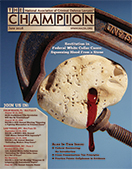June 2016

This month’s issue lays out the law and offers tips for mitigating the heavy load of a restitution obligation in a white collar case.
Articles in this Issue
-
Affiliate News
Affiliate News for June 2016 Champion.
-
An Introduction to Federal Sentencing
While the sentencing of criminal defendants has not changed much after the 2005 decision in United States v. Booker, sentences are not controlled by the Sentencing Guidelines in the same way they used to be. Judges have more flexibility to evaluate cases individually. Even for courts that are willing to impose sentences outside the guidelines range, the guidelines are still important. The guidelines are the starting point. It is therefore still important to understand how they work.
-
Book Review: The Wrong Carlos - Anatomy of a Wrongful Execution
This is a sad, absorbing, and profoundly important tale of a wrongful conviction and execution. Everyone with an interest in criminal justice and every public official with responsibility in this realm should place it high on their reading list.
-
Cross-Examination Principles
Cross-examination does not have to be combative, yet at times it can and should be. With each question, lawyers are testing the validity of the witness and the content of the testimony. Questions should not be wasted. Each should have a purpose and advance the objective of the examination. More than any other sector of trial law, cross-examinations win or lose most criminal trials. Veteran defense attorney Richard Jaffe discusses 10 principles of cross-examination and the challenges that may arise.
-
From the President: Collateral Consequences Are Too Often Unjust Consequences
Collateral consequences imposed without regard to whether they are justified by the individual’s conduct, and without an opportunity to ever terminate their effect even after an individual demonstrates rehabilitation, represent a system out of step with its purpose.
-
Getting Scholarship Into Court Project
Getting Scholarship Into Court Project, June 2016 Champion.
-
Grassroots Advocacy: The Legislative Session Is Over - Now What?
Now that states have adjourned their legislative sessions, how can advocates engage in further education and outreach?
-
Inside NACDL: NACDL’s Relentless Efforts to End Overcriminalization
In 2016, NACDL’s Board of Directors adopted a resolution opposing all laws that base criminal liability and/or penalty enhancements on HIV status rather than intent to harm another.
-
Letter to the Editor
Letter to the Editor by Rich Cassady, June 2016 Champion.
-
NACDL News: Clemency Project 2014 Surpasses 1,000 Submitted Clemency Petitions
In early May, the working group known as Clemency Project 2014, which was formed by NACDL, the American Civil Liberties Union (ACLU), Families Against Mandatory Minimums (FAMM), the American Bar Association (ABA), and the Federal Public and Community Defenders, surpassed a major milestone, submitting its 1,000th petition to the Office of the Pardon Attorney. The Project achieved this milestone on the heels of President Obama’s 58 grants on May 5, 2016 — the second group in fewer than six weeks to have their sentences commuted.
-
NACDL News: Kosovo Lawyers Visit NACDL
Attorneys from Kosovo, participating in a State Department International Visitor Leadership Program titled “Investigating Judicial and Prosecutorial Misconduct,” visited NACDL on May 25. The delegation included a prosecutor as well as the senior justice inspector and the director of the Office of the Disciplinary Counsel.
-
NACDL News: NACDL Welcomes Bipartisan Legislation to Block Proposed Rule 41 Changes
In mid-May NACDL welcomed the introduction of the Stopping Mass Hacking Act (S. 2952) by Sen. Ron Wyden (D-OR), Sen. Rand Paul (R-KY), Sen. Tammy Baldwin (D-WI), Sen. Steve Daines (R-MT), and Sen. Jon Tester (D-MT), to prevent changes to Rule 41 of the Federal Rules of Criminal Procedure from taking effect. Subsequently, on May 25, 2016, Rep. Ted Poe (R-TX) and Judiciary Committee ranking member John Conyers (D-MI) introduced H.R. 5321, the House version of the bill. They were joined by committee members Blake Farenthold (R-TX) and Zoe Lofgren (D-CA).
-
NACDL News: NACDL Welcomes House Passage of Email Privacy Act
The House Judiciary Committee passed out of committee the Email Privacy Act (H.R. 699) by a vote of 28-0 on April 13, 2016. This bill is a long overdue update of the Electronic Communications Privacy Act (ECPA), a bill passed in 1986 that governs the treatment of electronic communications. The Email Privacy Act establishes that law enforcement officers must obtain a warrant to access the content of most electronic communications and cloud-stored content from third-party providers and eliminates the arbitrary rule that would allow the government to obtain emails older than 180 days with a subpoena. On April 27, the Email Privacy Act passed the full House by a unanimous vote of 419 to 0.
-
NACDL® 2016 Election Procedures
NACDL® 2016 Election Procedures.
-
Practice Points: Cellphones in Evidence
Defense counsel should be wary when the defendant’s case involves a seized cellphone that may be introduced into evidence. Are the jurors going to take the phone into the jury room? Is the cellphone inoperable? What should the defense team do if it is blindsided by jurors accessing the cellphone during deliberations? It is crucial to examine the cellphone carefully to make sure it contains no unexpected incriminating information. In addition, defense counsel should check for deleted or normally hidden information that might be restorable by a tech-savvy juror.
-
Restitution in Federal White Collar Cases: Squeezing Blood From a Stone
Although an attorney may represent white collar defendants, this does not mean the clients have endless amounts of money and assets. The imposition of a hefty restitution amount imposes a massive burden. That taxing penalty cannot be eliminated. Instead, it is important to keep the client informed and reduce, when permitted, the client’s obligation. What are the client’s restitution obligations while on probation? What can the court do if the client is in default?
